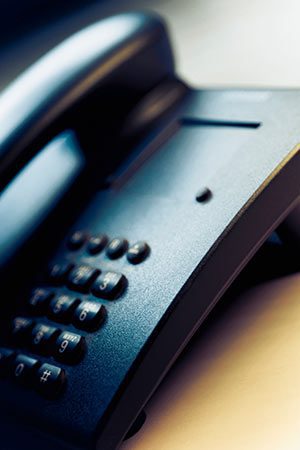
Keep Your Business Safe from Phishing and Vishing

You may have heard of “phishing” scams carried out against individuals and small businesses, but what exactly is phishing?
Phishing “refers to the process where a targeted individual is contacted by email or telephone by someone posing as a legitimate institution to lure the individual into providing sensitive information such as banking information, credit card details, and passwords.”
Since telephone calls are still considered a secure form of communication, voice phishing scams try to take advantage of your trust to steal money or personal information using the phone. This type of scam is called voice phishing – or “vishing” – and these crimes continue to rise.
Some common vishing scams are as follows:
- The caller poses as a representative of the IRS and claims that the victim owes money to the service. The caller then threatens that the victim will be arrested, deported, or have their driver’s license suspended if they do not send the balance on a pre-loaded debit card or through a wire transfer. If you receive this call, record the employee’s name, badge number, call back number and caller ID if available. Call 1-800-366-4484 to determine if the caller is an IRS employee with a legitimate need to contact you.
- The scammer uses an automated system to dial random phone numbers. When the victim picks up, a text-to-voice machine tells the victim that their credit card or bank information has been compromised and advises them to call a specific number immediately. Once they call the number, another automated voice walks them through the process of submitting their credit card number, bank account number, or other sensitive financial info. Credit card companies and banks will not ask for specific information like account numbers, card numbers, or account passwords in a phone call. Hang up and contact your credit card company or bank about this vishing call.
How can you identify these calls as fraudulent?
• When a caller claims to represent a specific company, ask for his or her name or employee number and call the company back using an independent and trusted source, like your billing statement or the phone book.
• Do not call the number provided by the caller.
• Don’t be afraid to hang up if something doesn’t seem right. If it sounds ‘fishy’ it probably is.
What can you do if you believe you’ve received a vishing call?
- You aren’t obligated to do anything, but if you want to report the vishing call to the authorities, you can reach out to the Federal Trade Commission, the FBI, or the U.S. Treasury Inspector General (only for IRS impersonator calls). Each agency will want information like the phone number the caller used, the agency or business the caller claimed to represent, and a narrative of the incident.
- If you gave your information to the caller, report a potential incident of identity theft to the Federal Trade Commission’s IdentityTheft.gov website. They will collect information on the incident and build a personalized recovery plan for you.
Categories: Blog






